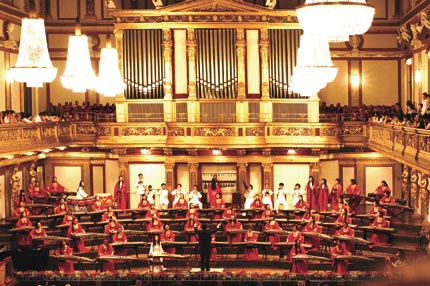Chinese music in Vienna
Vienna's Musikverein is considered one of the world's three holies of concert halls by music connoisseurs, and its awesome status and prestige make it a magnetic "golden hall" for aspiring Chinese musicians and music lovers.
Four Chinese Lunar New Year concerts will be staged there and free tickets are expected to be given out to ensure the house is full.
To perform in the glorious hall is considered a great achievement and a sign that they must be the best in the world. To play there is to have arrived and many Chinese performers view that stage as an almost sublime goal.
To ensure a good audience and hence good press reports back home, Chinese performances often offer free tickets, say entertainment experts.
|
|
|
Chinese musicians dressed in traditional costumes stage a Lunar New Year concert at Musikverein. [Shanghai Daily] |
"Playing there is more like a mission on a musical journey - it represents, for many Chinese, far more than a pure music performance," says Tian Qing, a well-known composer and director of the Intangible Heritage Study and Protection Center of the China Art Academy in Beijing.
"They seek to be known by worldwide audiences and the international performing markets. It's also a big honor in the resumes of their art career," he says.
Of course, it's not quite the case that only the best of the best perform there, since anyone can rent the magnificent hall that seats 1,744 with standing room for 300 in non-peak periods. It is home to the Vienna Philharmonic and its legendary New Year's Eve concerts that are broadcast worldwide.
Rental for one night can be as high as 70,000 euros (US$100,740), excluding many other costs.
For the Chinese Lunar New Year which falls on February 14, four concerts are scheduled at Musikverein from late January till the beginning of February, and at least six others are expected this year.
"We are confused about which one is the real 'Chinese Spring Festival Concert'," says Chiang Chin Tai, a Chinese businessman who lives in Vienna.
Last year three Chinese concerts were staged there during the holiday and every year around 10 Chinese performances take the stage - from sublime soloists to charming but out-of-place ethnic music and children's shows.
The gilded and ornate Musikverein refers to both the Society of Music Lovers that owns the hall and the hall itself. Music connoisseurs rank it aesthetically and acoustically along with the Boston Symphony Hall and Amsterdam's Concertgebouw.
It was inaugurated by Emperor Franz Joseph in 1870 and has been known over the years for its highly discerning audience.
To Chinese it enjoys the reputation of a "golden hall with a golden sound."
It may be the musical grail today, but the godlike status of the Musikverein causes misunderstanding about the standard of classical music in China. The passion for Chinese ensembles to perform there is likely to cool down in the near future, according to some Chinese music scholars.
How do you get to Musikverein? Money, money, money.
"If you have enough money to rent the venue, you can stage a performance there and that's not just performance management companies but some tourism companies," says a former employee of a Chinese tourism company surnamed Li, who is familiar with the hall. Rental of 70,000 euros is not uncommon, he says.
But for the performers and ensembles that take the stage, commercial success is not the issue. To take the stage is all important. And there must be a big audience.
"Only when the audience presence is satisfactory can the concert be seen as a successful hit," says Li. "Then the press in China will report that 'the concert at the Musikverein was a great success'."
Ticket prices at various concerts range from 5 euros to 90 euros. Tickets for the New Year's Eve concert can be 200-300 euros.
To ensure a big audience, free tickets for officials, media and VIPs are commonly provided for Chinese performances at Musikverein, says Li. In contrast, there are very few free tickets to Western concerts.
Chinese Lunar New Year's concerts in Musikverein attract many in the audience with free tickets.
"Some concerts from China provide almost 900 free tickets - the loss of revenue from ticket sales is shocking," says Li.
As Chinese musicians and the classical music scene mature, there will be less of a rush to play in Musikverein, say Professor Zhang Yiwu, vice director of the Art Resource Study Center at Peking University.
"As Chinese people become more and more aware of the commercial operation of performances in oversea markets, they will understand that many performances in high-level venues like Musikverein can only be achieved by paying high rental fees," he says.
The peak periods for Chinese performances in Musikverein are during the Spring Festival, National Day and summer holidays, when most performers are student ensembles.
Not all Chinese performances are appropriate (and in fact some are quite embarrassing), such as traditional folk music concerts and children's dance shows. There isn't much coverage in the local and music press.
Chinese living in Vienna are also discerning.
"As Chinese living overseas, we look forward to high-level concerts from our motherland," says businessman Chiang. "But we expect the really fine performances - quality, not quantity."
 0 Comments
0 Comments








Go to ForumComments